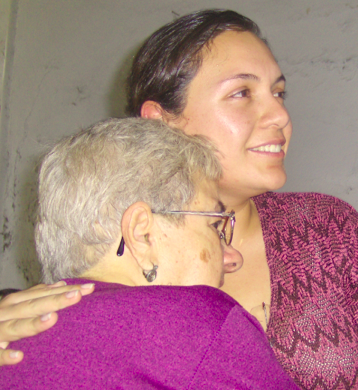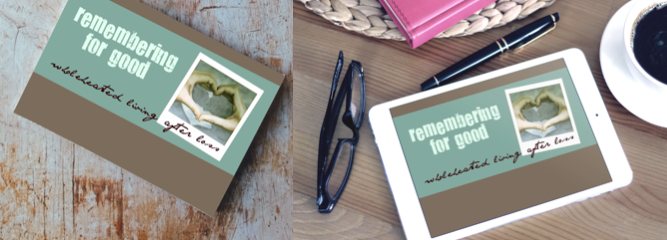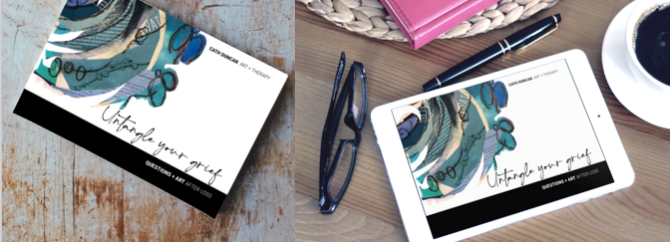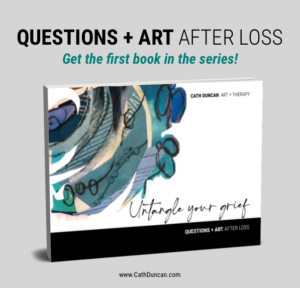The idea of “closure” has been popular idea in the world of grief counseling in the modern Western world for some time. The traditional belief is that our relationships end when someone dies and that, in order to find peace with that ending, we ideally need to have had all the conversations we would have wanted to have and said all the things we would have wanted our loved ones to know before they die. And then after their death, we need to accept the end of the relationship, “let go” through goodbye rituals, and move on to invest our love elsewhere. People who pursue an ongoing connection with their loved ones who’ve died are often pathologized because this runs contrary to modern Western rational culture.
I’ve shared my thoughts on the pursuit of closure before. Like me, many people don’t resonate with the idea of closure and feel that our relationships with our loved ones can and do endure in some form, even after their biological death. There are many kinds of death, of which biological death is only one. And you don’t have to be religious and believe that your loved one is in heaven in order to feel an ongoing connection with them. Our stories, legacy, influence and genetics often live on in many forms after we’ve died. We continue to relate to our loved ones who’ve died, through memory at least, and many people report other ways that they’ve felt able to feel an ongoing connection with their loved ones after their death.
For a lot of people, the idea that their relationship ends when their loved one dies is a very painful idea. Jessica is one such person. She had things she would have wanted to say to her grandmother before her grandmother died, but her grandmother died suddenly and unexpectedly, so she never got to tell her those things. As a result, she was feeling a lot of pain, guilt and regret around her relationship with her grandmother and her grandmother’s death.
She was carrying this pain as a heavy emotional weight, and felt that this emotional weight was also literally being carried as additional physical weight that her body was unwilling to let go of. Through our work together, Jessica discovered that her relationship with her grandmother hadn’t ended, and she was able to design deliberate ways to feel her connection with her grandmother. The guilt and regret dissolved and an interesting thing happened with the physical weight too. I’ll let Jessica share what happened…
________________________________________________________________
Jessica’s story, in her own words:
 “I believe my body has emotional memory. This year I’ve done a lot of internal work as part of several coaching certifications I’ve been thru. Back in January I decided the theme for my year was going to be “release.” And boy did I release so many things! I learned how to deal with emotions (I don´t believe in negative emotions any more), and as a result my weight melted away. Until I reached the gateway of 140 pounds, when I started to pile the pounds back on. I was 140 pounds when my grandmother died 4 years ago, just 3 weeks before of my wedding. I intuitively knew that the reason my body was resisting losing further weight was because I was carrying the weight of guilt, regret and grief in my body.
“I believe my body has emotional memory. This year I’ve done a lot of internal work as part of several coaching certifications I’ve been thru. Back in January I decided the theme for my year was going to be “release.” And boy did I release so many things! I learned how to deal with emotions (I don´t believe in negative emotions any more), and as a result my weight melted away. Until I reached the gateway of 140 pounds, when I started to pile the pounds back on. I was 140 pounds when my grandmother died 4 years ago, just 3 weeks before of my wedding. I intuitively knew that the reason my body was resisting losing further weight was because I was carrying the weight of guilt, regret and grief in my body.
Let me explain… I love my grandmother, although I always thought I wasn’t the favorite granddaughter. We were very different and she was always saying I should spend more time partying and having a “personal life” rather than studying or getting an MBA. “A lot of masters, and what about the Mister?” she once said.
My grandmother conveniently lived just 10 minutes away from the airport, so I decided to move with her during a specially travel intensive period in my life. She was strong, energetic, and high spirited until the day she fell and broke her arm. I was handling last minute preparation details for my wedding and just visited her in a hurry. I remember being angry at her and thinking, “Really? Are you doing this to me just 3 weeks before of my wedding? If you really love me, you will hurry up and heal and be there with me”. Those were the kind of thoughts I had back then (years before I discovered the power of coaching).
On the last day that I saw her alive, she was weak. I was angry. I didn’t say hello or good bye. I didn’t asked how she felt or if there is something I could do. She died suddenly two days later.
I was in shock. I hadn’t expected her to die. I felt intense anger, guilt and regret during the memorial service and ever since. I cried and cried and cried. And then I missed her dearly on my wedding day. I was the first granddaughter to get married and she wasn’t there. I bought a house with my husband and she wasn’t there. I wore that great ring of diamonds she gave me as a posthumous gift, and she wasn’t there to see me, or hug me.
After her death, I was unable to speak about her without crying or feeling guilty of not hugging her for the last time, or telling that I loved her. I really, really loved her. I came to work with Cath in the hope that I would be able to find a way to release the guilt and regret about the way that things ended with my grandmother and the fact that I never told her I loved her and thanked her for all she’d done for me before she died.
“What do you think is the positive intention of that emotional and physical weight you’re carrying?” Cath asked. She kindly asked three times, because I was only able to come up with why I wanted to release it. Then suddenly the answer burped out of my mouth: “Because my grandmother called me Fatty.”
There it was. “Fatty” was her loving name for all of the women she loved, myself included. When we explored this further, I realized that my body was holding onto the guilt and regret (the emotional weight) as well as the physical weight, in an attempt to preserve my feeling of connection with my grandmother – as a way to feel like I was still her “Fatty.” Some part of me thought that the only way I could continue the bond with my beloved grandmother was thru guilt, pain, and extra weight.
The minute I realized it was a misguided intention, I felt a gray fog lifting my body. My chest felt so light and open, and I was able to breathe deep again. Grief then lead to peace when I Cath asked, “Is it true that relationships have to end when someone dies? What if there were other ways that you could preserve your connection with your grandmother?” I realized that if it’s possible to continue my relationship with my grandmother after her death, then I didn’t have to have all of my conversations done before she died.
I felt an honest relief as I began to explore ways that I could remember her, and continue to acknowledge and grow our relationship. I realized that I’m connected to my grandmother through my genetics – we share the same tone of skin. I’m connected to her through some of my core personality traits, such as my tenacity, strength and confidence. I have my memories and I can nurture those. I left the session with the intention to pay more attention to the ways that I experience an ongoing connection with my grandmother and to open to the possibility of discovering new ways to feel connected to her. I decided that this year I’ll celebrate New Years in my grandmother’s home, and I would wear her socks as a way to remind myself of our ongoing connection.
The next night, my grandmother visited in my dreams. “I was waiting to visit you for so long!” she told me with her arms wide open. “I love you and I’ve missed you so much,” I whispered, while hugging her so tight that I could feel her curls in my cheek. “I’m okay Fatty. I just wanted to visit you,” she replied. And then I woke up with a deep sense of contentment and happiness showering through my body. I went to the bathroom scale just to confirm what I already knew: I had lost 5 pounds.
Now I know that our bond can be alive through joy, through peace and through contentment. Our love is stronger that death.”
________________________________________________________________
 About Jessica: Jessica is a Weight and Body Image Coach, with a Soul-Mind-Body approach who works with women (and some lucky men) to help them understand what are the lessons extra-weight carry, so they can release it and move on to be the CEO (Chief Enjoyment Officer) of their life. Jessica can be found at www.amateyadelgaza.mx, on Facebook and on Twitter.
About Jessica: Jessica is a Weight and Body Image Coach, with a Soul-Mind-Body approach who works with women (and some lucky men) to help them understand what are the lessons extra-weight carry, so they can release it and move on to be the CEO (Chief Enjoyment Officer) of their life. Jessica can be found at www.amateyadelgaza.mx, on Facebook and on Twitter.
________________________________________________________________
Jessica’s story is a beautiful example of what can happen when we choose to listen to our own heart’s call for what we need when we’re grieving, rather than blindly following cultural beliefs about death and what we need when we’re grieving. Jessica opened herself to the possibility of connection (which was her true heart’s desire), even though she didn’t know how that would or could happen. As a result, she found ways to experience and nurture her connection with her grandmother, and the guilt and regret dissolved, along with the physical weight she’d intuitively felt was related to the emotional weight.
There are so many ways that we can experience and nurture ongoing connections with our loved ones who have died, so this story is not here to dictate to you any spiritual dogma, or that our loved ones should visit us in our dreams. And I’m not offering this story to open a debate about spiritual and religious beliefs about where our loved ones go after death, and whether they can actually visit us in their dreams. You don’t have to be religious or spiritual to experience an ongoing connection with your loved ones who have died. I’m offering this story as one example of what can happen (just one of many possibilities) when we choose to loosen our attachment to the idea that relationships end when people die, and instead of pursuing closure and “letting go” rituals, we open to the possibility (and mystery) of experiencing an ongoing connection beyond biological death.
I’d love to hear… how have you experienced an ongoing connection with someone you love who has died? And how has that helped you in your grieving?
Would you like guidance to explore and heal your grief?
I’ve put together a 35-page grief “workbook” for you; an introduction to Remembering For Good and living wholeheartedly after loss. Learn more about the Remembering For Good grief workbook.
The first book in the QUESTIONS + ART AFTER LOSS series, Untangle Your Grief is a beautiful 65-page book of artful questions and creativity-sparking art prompts to help you to create meaning, belonging, and hope after loss.




What a beautiful story! It reminds me of a dream I had a few months back, years after my grandfather died. He told me he was proud of me and what I was doing. I didn’t realize until I had that approval how much it meant to me…
@kirstenasimmons It’s wonderful the gifts we can receive (that we didn’t even know we needed/ wanted) when we open up to the possibility of connection (with both the people who have died and the people who are still living)
This is just what I needed to hear today. My dear cousin passed away suddenly yesterday. I have been racked with guilt and regret over not making more of an effort to spend time with her, especially when I knew she was dealing with her health condition. I am determined to keep my connection with her alive, and will keep my eyes and heart open to the many possibilities I can continue my conversations with her. Thank you for helping me with this difficult part of the grieving process. God bless you.
Need Advice On Losing Weight? Check Out These Tips!https://tinyurl.com/ku554ww